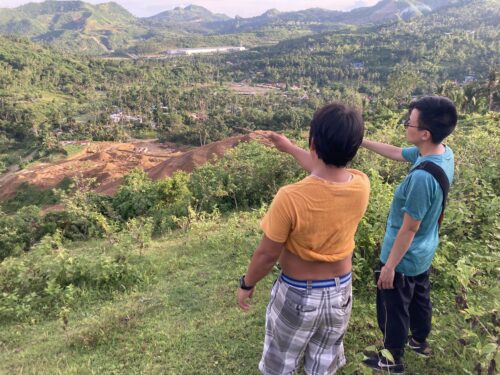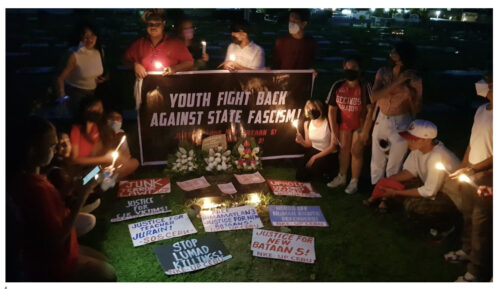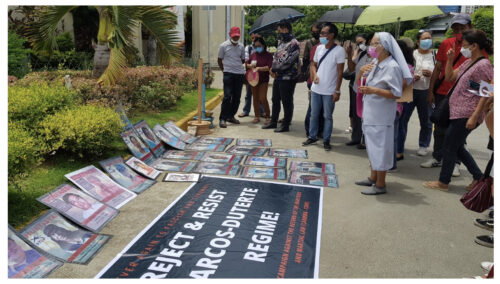By: Bev Tang

Open pit mining below one of the villages we visited which has caused a huge crack to develop across their land (which sits on the hill above the quarry) and has damaged several houses and keeps the peasants worried about landslides during heavy rains. The company is quarrying for cement as part of a land reclamation project to extend the shoreline for a techno business park that seeks to attract foreign investors and big businesses.
I had the opportunity to travel to Cebu, Philippines in May for the International Observers Mission (IOM)* to conduct interviews on the conduct of the 2022 national and local elections. The stakes were high as outgoing President Rodrigo Duterte faces numerous accusations of rampant human rights violations under his administration and a call for trial by the International Criminal Court. By the time I arrived, the counts already had Bong Bong Marcos (the junior of former dictator Ferdinand Marcos) as winning for President and Sarah Duterte daughter of Rodrigo Duterte winning for Vice President.
In Cebu, we spoke to street vendors fighting against privatization, fisherfolk still reeling from the aftermath of a major typhoon, peasants caught in a land reclamation project that has put their entire village on the verge of a disastrous landslide, workers and jeepney drivers facing exploitative conditions, teachers and youth organizations pushing for candidates with pro-people platforms. Their stories of widespread vote buying, massive voter disenfranchisement, polling place irregularities, and harassment of activists all had uncanny parallels to the power grab moves we’ve witnessed here in the US – to be expected as the Philippines is still a semi-colonial country whose economy, politics, and military are still largely at the behest of the US.
Aside from broken electronic vote count machines, long voting lines in the heat, and questionably fast release of results, the incumbent Duterte president has used its six years in power to erase the brutal Marcos’ 20-year dictatorship and implementation of martial law and paint it as the golden years. He also paved the way for complete control of all 3 branches of government using a combination of politicking and extrajudicial killings under his so-called drug war to sow fear in his enemies (Cebu had two assassinations of local mayors in 2018-19) and counterinsurgency tactics of terror tagging workers, peasants, organizers and any opposition – reminiscent of McCarthy’s red scare and Bush’s Patriot Act.
Candidates for local government positions would then align with the Marcos-Duterte ticket in exchange for protection and privileges. In the Philippines, elections are a prime time to put your cards in place to secure development projects where the local mayor gets no less than a 30% cut. With control of the highest local positions, alignment is also needed with the Presidential seat to secure national permits & clearances. Even a prominent attorney we interviewed attested that legal recourse of communities against these privatization projects is almost impossible due to deeply embedded collusion between contractors, local to national governments, and foreign funding. The attorney added that the US doesn’t care who wins as long as they don’t fall out of line with US interests.
All in all, to quote an organization monitoring Elections Fraud called Kontra Tikas, “The elections may not bring about desired changes because it is still a contest primarily of the elite.”
Democracy in an imperialist empire and its neo-colonies can only be for the ruling elite and their cronies. In the end, it is the common people who lose out. But the Filipino people have never taken their oppression sitting down – since Spanish colonization, US and Japanese imperialism to the current day where they are waging a mass movement for genuine national liberation and democracy. All the communities we visited are fighting local campaigns while being a part of this concerted national effort.
For the comprehensive final report of the Philippines Election 2022 by the International Coalition for Human Rights in the Philippines (ICHRP), please click here.
*The IOM is hosted by International Coalition for Human Rights in the Philippines (ICHRP)

Memorial at the gravesite of Chad Booc – a human rights advocate and teacher in an indigenous school who was killed by the Philippine military.

Memorial at the gravesite of Chad Booc – a human rights advocate and teacher in an indigenous school who was killed by the Philippine military.
